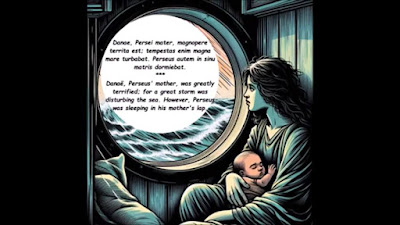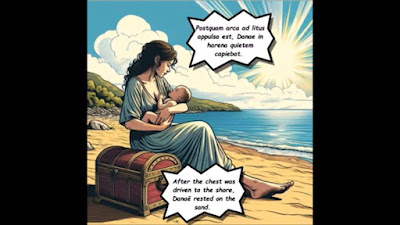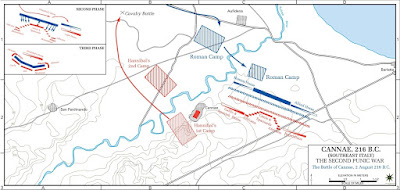Referring to: https://adckl.blogspot.com/2024/07/010924-level2-story-of-perseus.html
What you see in these extracts from the cartoon are all the
key points of the perfect passive. This post is simply giving
an overviewof how this form of the verb works; it will be covered
in greater detail later.
Image #1: Danaē, Perseī māter, magnopere territa est.│Danae, the mother of Perseus, was greatly frightened.
Present tense of the verb sum, esse + the perfect passive participle:
https://adckl.blogspot.com/2024/07/280824-follow-up-on-previous-post-how_79.html
This is an example of the perfect passive, the equivalent of
English “This book was written by Charles Dickens” or
“He has been injured by an arrow.”
The participle will agree with the subject: Danaē, Perseī
māter, magnopere territa est.
The major difference between Latin and English is that,
while English uses “was” plus the past participle, Latin uses the present
tense of the verb sum, esse (to be).
Some further examples from the entire text:
Image #2: Postquam arca ad lītus appulsa est, …
│ After the chest / ark was driven on to the shore, …
Images #3 and #4: The perfect passive with the passive agent i.e. the person by whom the action was performed; the passive agent is expressed by ā / ab + the ablative case:
Postquam breve tempus ¦ ā piscātōre quōdam
¦ reperta est, … │ After a short time she was found ¦ by a
certain fisherman.
… et ad domum rēgis Polydectis adducta est. │ …
and (was) brought to the house of King Polyectes.
Image #5
Cēterae Gorgōnēs [feminine plural] statim ē somnō excitātae sunt [feminine plural], et … ¦ īrā ¦ commōtae sunt [feminine plural]. │ The rest of the Gorgons were immediately awakened from (their) sleep and … were filled with rage [= literally: moved by anger].
Note here that they are filled with rage i.e.
it is not a person who is performing this action but the means
by which they became angry; Latin uses no preposition here.
[i] Postquam breve tempus ¦ ā piscātōre quōdam
¦ reperta est, … │ After a short time she was found ¦ by a
certain fisherman.
[ii] Gorgōnēs … ¦ īrā ¦ commōtae sunt. │ The
Gorgons were (literally) moved ¦ by anger.
Image #6: There are two possibilities of translation
depending upon context:
Referring to the Gorgons …
Capita enim eārum anguibus omnīnō contēcta erant.
Manus etiam ex āere factae erant.
Here, the imperfect tense of sum, esse is being used:
For their heads were completely covered with
snakes. Their hands were also made of bronze.
The participles are acting like adjectives here, simply
describing what they looked like rather than something that happened to the
Gorgons. However, using the imperfect tense can also convey “had been (done)”
i.e. the first part of the sentence could equally translate as: “Their
heads had been completely covered with snakes.”
From the text:
Tum ad rūpem vēnit ubi Andromeda vīncta erat. │
Then he came to the rock where Andromeda had been tied.
Some more examples from the text of the perfect passive
without further comment:
ā deō iussus est │ he was commanded by
the god
in āera sublātus est. │ he was carried
up into the air
Mox tamen ¦ ā Perseō ¦ ictū graviōre ¦ vulnerāta est.
Tum iterum sē in undās mersit, neque posteā vīsa est. │ Soon,
however, it was wounded ¦ by a
more serious / heavier blow ¦ from Perseus. Then again it plunged
itself into the waves, and afterwards was not seen again.











